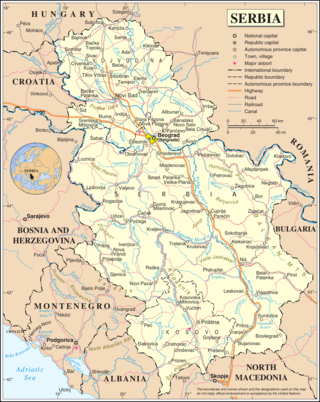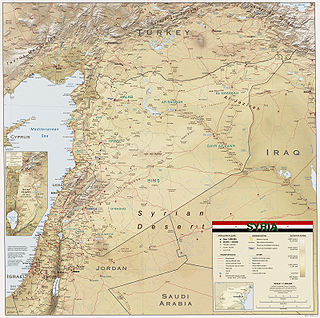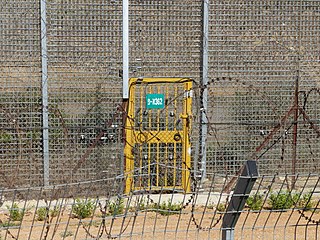
The United Nations (UN) is a diplomatic and political international organization with the intended purpose of maintaining international peace and security, developing friendly relations among nations, achieving international cooperation, and serving as a center for coordinating the actions of member nations. It is widely recognised as the world's largest international organization. The UN is headquartered in New York City, in international territory with certain privileges extraterritorial to the United States, and the UN has other offices in Geneva, Nairobi, Vienna, and The Hague, where the International Court of Justice is headquartered at the Peace Palace.

The United Nations Security Council (UNSC) is one of the six principal organs of the United Nations (UN) and is charged with ensuring international peace and security, recommending the admission of new UN members to the General Assembly, and approving any changes to the UN Charter. Its powers as outlined in the United Nations Charter include establishing peacekeeping operations, enacting international sanctions, and authorizing military action. The UNSC is the only UN body with authority to issue resolutions that are binding on member states.

The member states of the United Nations comprise 193 sovereign states. The United Nations (UN) is the world's largest intergovernmental organization. All members have equal representation in the UN General Assembly.
A United Nations General Assembly resolution is a decision or declaration voted on by all member states of the United Nations in the General Assembly.

The Shebaa Farms, also spelled Sheba'a Farms, also known as Mount Dov, is a strip of land on the Lebanese–Syrian border that is currently occupied by Israel. Lebanon claims the Shebaa Farms as its own territory, and Syria agrees with this position. Israel claims it is part of the Golan Heights, Syrian territory that it has occupied since 1967 and effectively annexed in 1981. This dispute plays a significant role in contemporary Israel–Lebanon relations.
China is one of the members of the United Nations and is one of five permanent members of its Security Council. One of the victorious Allies of World War II, the Republic of China (ROC) joined the UN upon its founding in 1945. The subsequent resumption of the Chinese Civil War between the government of Republic of China and the rebel forces of the Chinese Communist Party, led to the latter's victory on the mainland and the establishment of the People's Republic of China (PRC) in 1949. Nearly all of Mainland China was soon under its control and the ROC government retreated to the island of Taiwan.

The Blue Line is a demarcation line dividing Lebanon from Israel and the Golan Heights. It was published by the United Nations on 7 June 2000 for the purposes of determining whether Israel had fully withdrawn from Lebanon. It has been described as "temporary" and "not a border, but a “line of withdrawal”. It is the subject of an ongoing border dispute between Israel, Lebanon, and Hezbollah.

The United Nations Disengagement Observer Force (UNDOF) is a United Nations peacekeeping mission tasked with maintaining the ceasefire between Israel and Syria in the aftermath of the 1973 Yom Kippur War. The mission was established by United Nations Security Council Resolution 350 on 31 May 1974, to implement Resolution 338 (1973) which called for an immediate ceasefire and implementation of United Nations Security Council Resolution 242.

The United Nations Assistance Mission for Iraq (UNAMI) was formed on 14 August 2003 by United Nations Security Council (UNSC) Resolution 1500 at the request of the Iraqi government to support national development efforts.

United Nations Security Council resolution 970, adopted on 12 January 1995, after reaffirming all resolutions on the situation in Bosnia and Herzegovina in particular Resolution 943 (1994) concerning the border closure between the Federal Republic of Yugoslavia and Bosnia and Herzegovina, the Council decided that measures in that resolution would be suspended for a further period of 100 days.

United Nations Security Council Resolution 1994, adopted unanimously on 30 June 2011, after considering a report by the Secretary-General Ban Ki-moon regarding the United Nations Disengagement Observer Force (UNDOF), the Council extended its mandate for a further six months until 31 December 2011.

Humanitarian aid during the Syrian civil war has been provided by various international bodies, organizations and states. The main effort is coordinated by Jonh Ging of the United Nations Office for the Coordination of Humanitarian Affairs (UNOCHA). In 2014, U.N. Security Council Resolution 2165 authorised humanitarian aid to be supplied via four border crossings not controlled by the Syrian government, generally to supply rebel-controlled territory.

United Nations Security Council Resolution 2139 was passed by a unanimous vote of the Council on February 22, 2014, and calls on all parties in the Syrian Civil War to permit free access to humanitarian aid.

The United Nations Security Council Resolution 2254 was unanimously adopted on 18 December 2015. It calls for a ceasefire and political settlement in Syria. This document describes the roadmap for Syria's political transition. As of 2023, no real progress has been made to implement the resolution.
United Nations General Assembly Resolution 48/144 of 20 December 1993 is a resolution in which the General Assembly expressed its concern at the ongoing degradation of the humanitarian situation in Azerbaijan because of the displacement of considerable number of citizens due to Nagorno Karabakh conflict and supporting "emergency international assistance to refugees and displaced persons in Azerbaijan". The resolution is titled “48/114. Emergency international assistance to refugees and displaced persons in Azerbaijan”. It became the fifth United Nations document concerning Nagorno-Karabakh and the first United Nations General Assembly document on humanitarian aid to those affected by this conflict. This resolution was the first international document affirming the number of refugees and displaced persons in Azerbaijan exceeded one million. The document does not make any specific reference to previous UN resolutions on the ongoing conflict, but "its relevant resolutions regarding humanitarian assistance to refugees and displaced persons". The resolution was adopted by consensus without voting.

The eleventh emergency special session of the United Nations General Assembly opened on 28 February 2022 at the United Nations headquarters. It addresses the Russian invasion of Ukraine. Maldivian politician Abdulla Shahid served as President of the body during this time.

United Nations Security Council Resolution 2623 called for the eleventh emergency special session of the United Nations General Assembly on the subject of the 2022 Russian invasion of Ukraine. Albania and the United States introduced the resolution before the United Nations Security Council, which adopted it on 27 February 2022. Russia voted against while China, India and the United Arab Emirates abstained. As this was a procedural resolution, no permanent member could exercise their veto power.

United Nations Security Council Resolution 2165 was passed by a unanimous vote on 14 July 2014, and allows direct humanitarian access across four border crossings not controlled by the Syrian government.

United Nations Security Council Resolution 2585 was passed by a unanimous vote on 9 July 2021, which allowed UN agencies to continue to coordinate and deliver aid cross-border from Turkey to northwestern Syria without Syrian government consent. Russia had threatened to veto renewal of the mandate to allow cross-border aid, but agreed to a compromise the day before the mandate was set to expire on 10 July 2021.

United Nations Security Council Resolution 2533 was passed by a unanimous vote and adopted on 11 July 2020.
















